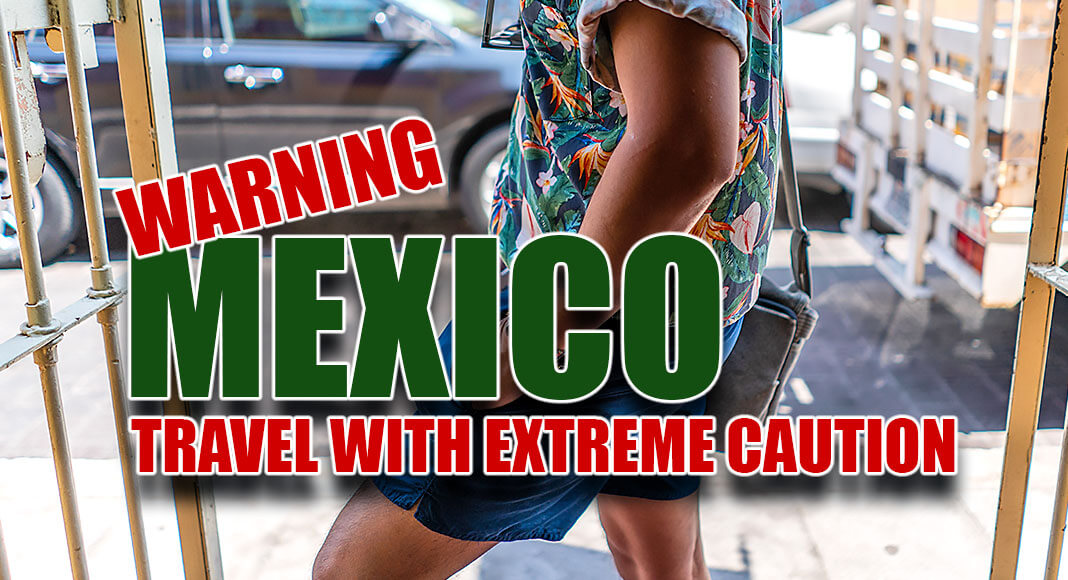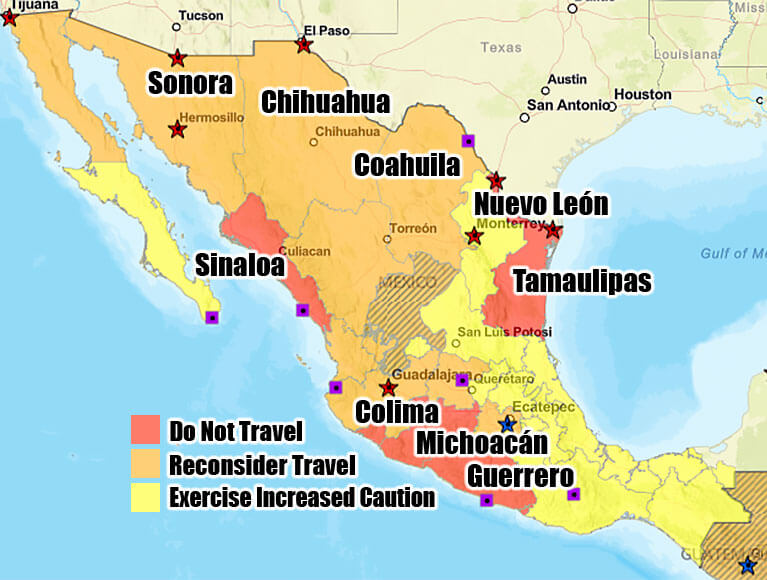
Texas Boder Business
According to the State Department of the United States, all U.S. Citizens should travel in Mexico with Extreme caution and follow all of the guidelines in the following advisory:

Country Summary: Violent crime – such as homicide, kidnapping, carjacking, and robbery – is widespread and common in Mexico. The U.S. government has limited ability to provide emergency services to U.S. citizens in many areas of Mexico, as travel by U.S. government employees to certain areas is prohibited or restricted. In many states, local emergency services are limited outside the state capital or major cities.
U.S. citizens are advised to adhere to restrictions on U.S. government employee travel. State-specific restrictions are included in the individual state advisories below. U.S. government employees may not travel between cities after dark, may not hail taxis on the street, and must rely on dispatched vehicles, including app-based services like Uber, and regulated taxi stands. U.S. government employees should avoid traveling alone, especially in remote areas. U.S. government employees may not drive from the U.S.-Mexico border to or from the interior parts of Mexico, except daytime travel within Baja California and between Nogales and Hermosillo on Mexican Federal Highway 15D, and between Nuevo Laredo and Monterrey on Highway 85D.
Read the country information page for additional information on travel to Mexico.
The Centers for Disease Control and Prevention (CDC) has determined Mexico has a high level of COVID-19. Visit the CDC page for the latest Travel Health Information related to your travel.
Do Not Travel To:
- Colima state due to crime and kidnapping.
- Guerrero state due to crime.
- Michoacan state due to crime and kidnapping.
- Sinaloa state due to crime and kidnapping
- Tamaulipas state due to crime and kidnapping.
- Zacatecas state due to crime and kidnapping.
Reconsider Travel To:
- Baja California state due to crime and kidnapping.
- Chihuahua state due to crime and kidnapping.
- Durango state due to crime.
- Guanajuato state due to crime and kidnapping.
- Jalisco state due to crime and kidnapping.
- Morelos state due to crime.
- Sonora state due to crime and kidnapping.
Exercise Increased Caution When Traveling To:
- Aguascalientes state due to crime.
- Baja California Sur state due to crime.
- Chiapas state due to crime.
- Coahuila state due to crime.
- Hidalgo state due to crime.
- Mexico City due to crime.
- Mexico State due to crime.
- Nayarit state due to crime.
- Nuevo Leon state due to crime and kidnapping.
- Oaxaca state due to crime.
- Puebla state due to crime and kidnapping.
- Queretaro state due to crime.
- Quintana Roo state due to crime and kidnapping.
- San Luis Potosi state due to crime and kidnapping.
- Tabasco state due to crime.
- Tlaxcala state due to crime.
- Veracruz state due to crime.
Exercise Normal Precautions When Traveling To:
- Campeche state
- Yucatan state
Visit our website for Travel to High-Risk Areas.
If you decide to travel to Mexico:
- Review the U.S. Embassy’s webpage on COVID-19.
- Visit the CDC’s web page on Travel and COVID-19.
- Keep traveling companions and family back home informed of your travel plans. If separating from your travel group, send a friend your GPS location. If taking a taxi alone, take a photo of the taxi number and/or license plate and text it to a friend.
- Use toll roads when possible and avoid driving alone or at night. In many states, police presence and emergency services are extremely limited outside the state capital or major cities.
- Exercise increased caution when visiting local bars, nightclubs, and casinos.
- Do not display signs of wealth, such as wearing expensive watches or jewelry.
- Be extra vigilant when visiting banks or ATMs.
- Enroll in the Smart Traveler Enrollment Program (STEP) to receive Alerts and make it easier to locate you in an emergency.
- Follow the Department of State on Facebook and Twitter.
- Follow the U.S. Embassy on Facebook and Twitter.
- Review the Country Security Report for Mexico.
- Mariners planning travel to Mexico should check for U.S. maritime advisories and alerts, which include instructions on reporting suspicious activities and attacks to Mexican naval authorities.
- Prepare a contingency plan for emergency situations. Review the Traveler’s Checklist.
Information Source: https://www.state.gov















